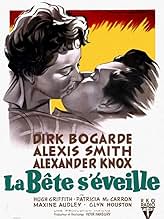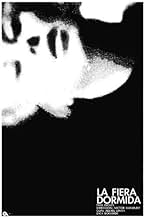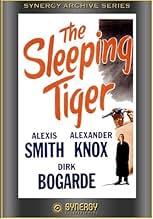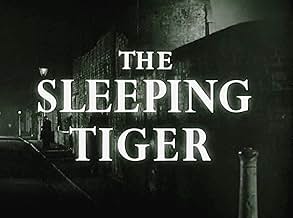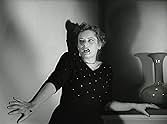ÉVALUATION IMDb
6,5/10
1,4 k
MA NOTE
Après avoir cambriolé le domicile d'un psychothérapeute, un criminel accepte de se faire soigner par celui-ci plutôt que d'aller en prison, mais c'était sans compter que la femme du thérapeu... Tout lireAprès avoir cambriolé le domicile d'un psychothérapeute, un criminel accepte de se faire soigner par celui-ci plutôt que d'aller en prison, mais c'était sans compter que la femme du thérapeute tombe amoureuse de lui...Après avoir cambriolé le domicile d'un psychothérapeute, un criminel accepte de se faire soigner par celui-ci plutôt que d'aller en prison, mais c'était sans compter que la femme du thérapeute tombe amoureuse de lui...
- Director
- Writers
- Stars
- Prix
- 1 nomination au total
Jimmy Charters
- Jazz Club Patron
- (uncredited)
Martin Lyder
- Jazz Club Patron
- (uncredited)
John Lynn
- Jazz Club Patron
- (uncredited)
Ross Parker
- Barman
- (uncredited)
Jim Tyson
- Jazz Club Patron
- (uncredited)
Harry Van Engel
- Spectator at crash
- (uncredited)
Avis en vedette
Joseph Losey, working under a pseudonym after his blacklisting, didn't want to make this overbaked British melodrama. And who can blame him, given the heavy-breathing histrionics of the screenplay, a ridiculous concoction about a psychiatrist and his sexually frustrated wife harboring a hoodlum. The plot turns are unconvincing, the music hilariously overblown, and Alexander Knox, as the shrink, terminally uninteresting.
What makes this mess watchable is its game imitation of American noir tropes (dark alleys, femmes fatales, car chases), and some good very early rock-and-roll/jazz in the pub sequences. Also, the film can be viewed as a warmup for the later Losey-Bogarde collaborations, which explored similar themes (guilt, moral ambiguity, the nature of evil) much more expertly.
What makes this mess watchable is its game imitation of American noir tropes (dark alleys, femmes fatales, car chases), and some good very early rock-and-roll/jazz in the pub sequences. Also, the film can be viewed as a warmup for the later Losey-Bogarde collaborations, which explored similar themes (guilt, moral ambiguity, the nature of evil) much more expertly.
Even his staunchest devotees would have to acknowledge that the films of Joseph Losey are notoriously uneven. This one is of interest to Losey completists as it marks his first film in England although sadly, for reasons which have been well documented, both he and adaptors Foreman and Buchman were 'fronted' in the credits.
Losey has done his very best with the melodramatic material at his disposal and has given the film an edginess unusual for the time. There is a palpable sexual tension(surprisingly enough) between the psychotherapist's wife of Alexis Smith and the case for treatment of Dirk Bogarde. It must be said that Bogarde was never really convincing as a heart-throb and here relishes the chance to be menacing. Alexis Smith, cast for the American market, has an extremely challenging role which obliges her to run the gamut and being a thorough professional she surmounts whatever the script throws at her. Her character, like the film itself, goes off the rails at the end but I'm sure that Esso Oil was grateful for the free advertising. Mention must be made of Alexander Knox who navigates the psychobabble and delivers his customarily solid performance.
Whether Losey had a choice of composer for this is debatable but unlike most of his films in which the music is extremely irritating, Malcolm Arnold's powerful score here is spot on and aids the film immeasurably whilst Harry Waxman is a good choice as cinematographer, having previously shot 'Brighton Rock'.
This opus might not have represented the most auspicious start to the Losey/Bogarde collaboration but they could only get better and with the notable exception of 'Modesty Blaise', they most certainly did.
Losey has done his very best with the melodramatic material at his disposal and has given the film an edginess unusual for the time. There is a palpable sexual tension(surprisingly enough) between the psychotherapist's wife of Alexis Smith and the case for treatment of Dirk Bogarde. It must be said that Bogarde was never really convincing as a heart-throb and here relishes the chance to be menacing. Alexis Smith, cast for the American market, has an extremely challenging role which obliges her to run the gamut and being a thorough professional she surmounts whatever the script throws at her. Her character, like the film itself, goes off the rails at the end but I'm sure that Esso Oil was grateful for the free advertising. Mention must be made of Alexander Knox who navigates the psychobabble and delivers his customarily solid performance.
Whether Losey had a choice of composer for this is debatable but unlike most of his films in which the music is extremely irritating, Malcolm Arnold's powerful score here is spot on and aids the film immeasurably whilst Harry Waxman is a good choice as cinematographer, having previously shot 'Brighton Rock'.
This opus might not have represented the most auspicious start to the Losey/Bogarde collaboration but they could only get better and with the notable exception of 'Modesty Blaise', they most certainly did.
At the time ,like so many others such as Dalton Trumbo,Joseph Losey used to work under pseudos because of his commie friends.
"The sleeping tiger" predates permanent features in the director's work:
-the intruder ,be it a servant "(eponymous movie) ,a licentious gypsy ("the gypsy and the gentleman" ),some kind of doppelganger ("Monsieur Klein" ,perhaps his masterpiece), a mysterious girl ("secret ceremony"),who makes the place his very own ,physically ("The servant" ) or mentally ('Monsieur Klein" ).Dirk Bogarde is fascinating in his part of a young offender :his acting is so subtle we do not know when the movie ends whether he is a victim or a perverse person,probably both.
-the depiction of the decay of a milieu the intruder will destroy : the old aristocracy in "the gypsy and the gentleman" ,the bourgeoisie in "the servant" the world of the war profiteers in " Monsieur Klein" . When Alexis Smith tells her husband's guinea pig that she got a raw deal too when she was a child but she made her way of life just the same ,the guy knows better :"because you think you are happy now?"
A shrink wants to study a case of delinquency and wakens the sleeping tiger...which is perhaps not the one you are thinking of.
Superlative performances by the three leads.
"The sleeping tiger" predates permanent features in the director's work:
-the intruder ,be it a servant "(eponymous movie) ,a licentious gypsy ("the gypsy and the gentleman" ),some kind of doppelganger ("Monsieur Klein" ,perhaps his masterpiece), a mysterious girl ("secret ceremony"),who makes the place his very own ,physically ("The servant" ) or mentally ('Monsieur Klein" ).Dirk Bogarde is fascinating in his part of a young offender :his acting is so subtle we do not know when the movie ends whether he is a victim or a perverse person,probably both.
-the depiction of the decay of a milieu the intruder will destroy : the old aristocracy in "the gypsy and the gentleman" ,the bourgeoisie in "the servant" the world of the war profiteers in " Monsieur Klein" . When Alexis Smith tells her husband's guinea pig that she got a raw deal too when she was a child but she made her way of life just the same ,the guy knows better :"because you think you are happy now?"
A shrink wants to study a case of delinquency and wakens the sleeping tiger...which is perhaps not the one you are thinking of.
Superlative performances by the three leads.
A more apt title would have been The Sleeping Tigress, for it's Alexis Smith's performance that holds this movie together and lends it erotic friction. Despite her old-money looks and regal carriage, Smith numbered among the many talents which Hollywood mis- and under- used. She claimed attention in two late-forties Bogart vehicles, Conflict (where she was good) and The Two Mrs. Carrolls (in which she was even better, and held her own against Barbara Stanwyck). But most of her movie career consisted of mediocre roles the ones the star actresses turned down or had to refuse owing to other commitments. (It wasn't until Stephen Sondheim's Follies on Broadway in the 70s that her own star shone).
In this film from Joseph Losey's English exile following the Hollywood witch hunt, she plays the bored wife of psychotherapist Alexander Knox (and with him pottering around the house, who wouldn't be bored?). Bleeding-heart Knox takes a troubled young man with a prison record (Dirk Bogarde) under his roof in hopes of performing a therapeutic Pygmalion job on him. At first Smith acts snooty, then grows intrigued, and finally throws herself at Bogarde with pent-up abandon.
Comes the crunch as Knox, in a three-minute Freudian breakthrough reminiscent of Lee J. Cobb's instant rehabilitation of William Holden in The Dark Past, turns the lying, thieving, abusive Bogarde into a contrite milquetoast. When Bogarde then bids her farewell, Smith careens into dementia every bit as swiftly as Bogarde was healed and feigns an assault in hopes that Knox will defend her `honor' with that gun every therapist keeps in his desk drawer....
It's a lame story that might have been more convincing in an American context; the London setting and British conventions (in particular Knox's) stifle it. Bogarde started out playing this sort of charming wrong'un but isn't especially memorable here (except for his towering pompadour that must have been borrowed from Mario Lanza). But Smith's feral feline makes The Sleeping Tiger worth the ticket price.
In this film from Joseph Losey's English exile following the Hollywood witch hunt, she plays the bored wife of psychotherapist Alexander Knox (and with him pottering around the house, who wouldn't be bored?). Bleeding-heart Knox takes a troubled young man with a prison record (Dirk Bogarde) under his roof in hopes of performing a therapeutic Pygmalion job on him. At first Smith acts snooty, then grows intrigued, and finally throws herself at Bogarde with pent-up abandon.
Comes the crunch as Knox, in a three-minute Freudian breakthrough reminiscent of Lee J. Cobb's instant rehabilitation of William Holden in The Dark Past, turns the lying, thieving, abusive Bogarde into a contrite milquetoast. When Bogarde then bids her farewell, Smith careens into dementia every bit as swiftly as Bogarde was healed and feigns an assault in hopes that Knox will defend her `honor' with that gun every therapist keeps in his desk drawer....
It's a lame story that might have been more convincing in an American context; the London setting and British conventions (in particular Knox's) stifle it. Bogarde started out playing this sort of charming wrong'un but isn't especially memorable here (except for his towering pompadour that must have been borrowed from Mario Lanza). But Smith's feral feline makes The Sleeping Tiger worth the ticket price.
A certain Victor Hanbury is credited with directing this remarkable psychological drama but that won't fool any of Joseph Losey's admirers since it shares not only thematic similarities with one of his most notable American films, THE PROWLER (1951), but was indeed the turning point of his career in many ways: blacklisted by Hollywood for his Communist leanings, Losey fled first to Italy and then to Britain, remaining in Europe for the rest of his days. THE SLEEPING TIGER also marked the start of a fruitful collaboration (resulting in five films) between Losey and star Dirk Bogarde, who here shows a definite maturity miles away from the bland matinée idol roles he typically played during this period; the film itself has an intensity not found in contemporary British cinema.
Alexis Smith (terrific in one of her last starring roles) and Alexander Knox (playing his part in the Glenn Ford manner – where a quiet exterior conceals a strong personality, hence the film's title) are the married couple whose sheltered suburban lives are invaded by smart but incorrigible thug Bogarde; Knox is a psychiatrist whom the young man had tried to hold up, but has the tables turned on him and is subsequently kept on in the former's house as a 'guinea pig' – echoes of BLIND ALLEY (1939) and THE DARK PAST (1948) – where he stirs up the passionate instincts of the doctor's frustrated American wife. Needless to say, there's no happy ending for any of the characters: the climax provides plenty of fireworks and twists – with Losey's ironic symbolism being maintained till the film's very last shot. Composer Malcolm Arnold adapts his score to each of the film's moods, alternating between the sleazy and the histrionic.
Unfortunately, the poor-quality Public Domain print I watched bears some evident signs of wear-and-tear as there are a handful of jarring jump-cuts throughout (resulting in a running-time of 87 minutes against the official 89); several years back, the film was released on PAL VHS but no official DVD is in sight yet in any region (a status, alas, in common with the majority of Losey's work prior to the 1960s).
Alexis Smith (terrific in one of her last starring roles) and Alexander Knox (playing his part in the Glenn Ford manner – where a quiet exterior conceals a strong personality, hence the film's title) are the married couple whose sheltered suburban lives are invaded by smart but incorrigible thug Bogarde; Knox is a psychiatrist whom the young man had tried to hold up, but has the tables turned on him and is subsequently kept on in the former's house as a 'guinea pig' – echoes of BLIND ALLEY (1939) and THE DARK PAST (1948) – where he stirs up the passionate instincts of the doctor's frustrated American wife. Needless to say, there's no happy ending for any of the characters: the climax provides plenty of fireworks and twists – with Losey's ironic symbolism being maintained till the film's very last shot. Composer Malcolm Arnold adapts his score to each of the film's moods, alternating between the sleazy and the histrionic.
Unfortunately, the poor-quality Public Domain print I watched bears some evident signs of wear-and-tear as there are a handful of jarring jump-cuts throughout (resulting in a running-time of 87 minutes against the official 89); several years back, the film was released on PAL VHS but no official DVD is in sight yet in any region (a status, alas, in common with the majority of Losey's work prior to the 1960s).
Le saviez-vous
- AnecdotesWhen this movie first appeared, the direction was credited to Victor Hanbury, a real-life Producer, who only agreed to take the credit when the actual Director, the blacklisted Joseph Losey, insisted that this would be a great help to him, as he needed the work. Although several versions of this movie, including the DVD, still credit Hanbury, there are prints where Losey is credited under his own name. The first several times it was shown on British television, in the late 1960s and early 1970s, Losey had the credit.
- GaffesAngry that Frank has left her Glenda wearing a black dress runs from the house, jumps in her car and drives off. Spotting Frank (Dirk Bogarde) walking along the road she stops and picks him up but she's now wearing a coat.
- Citations
Glenda Esmond: You're not going to give me notice, like a servant or a waitress!
- ConnexionsFeatured in Joseph Losey: The Man with Four Names (1998)
Meilleurs choix
Connectez-vous pour évaluer et surveiller les recommandations personnalisées
- How long is The Sleeping Tiger?Propulsé par Alexa
Détails
- Date de sortie
- Pays d’origine
- Langue
- Aussi connu sous le nom de
- Der schlafende Tiger
- Lieux de tournage
- William Mansell, 24 Connaught Street, Londres, Angleterre, Royaume-Uni(Smash & Grab 27 minutes from start)
- sociétés de production
- Consultez plus de crédits d'entreprise sur IMDbPro
- Durée1 heure 29 minutes
- Couleur
- Rapport de forme
- 1.37 : 1
Contribuer à cette page
Suggérer une modification ou ajouter du contenu manquant

Lacune principale
By what name was The Sleeping Tiger (1954) officially released in India in English?
Répondre
